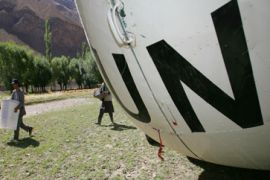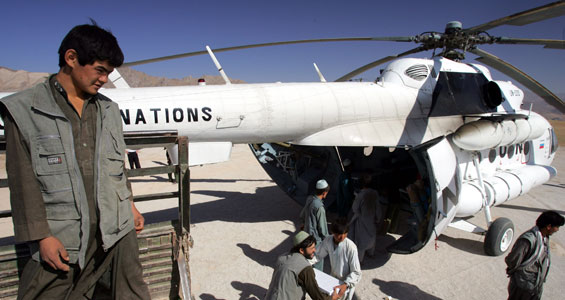Interview: Adrian Edwards
The UN mission in Afghanistan has increased its activities in the war-torn country.

 |
| The UN prepared local communities for Afghanistan’s first parliamentary elections [GALLO/GETTY] |
The UN has been providing assistance to Afghanistan since the Soviet invasion of the country in 1979 but significantly increased its aid efforts after the fall of the Taliban in 2001.
It was recognised at a meeting of Afghan leaders and world powers in Bonn, Germany in December 2001, that the “United Nations, as the internationally recognised, impartial institution, has a particularly important role to play”.
Keep reading
list of 4 itemsPalestinian Prisoner’s Day: How many are still in Israeli detention?
‘Mama we’re dying’: Only able to hear her kids in Gaza in their final days
Europe pledges to boost aid to Sudan on unwelcome war anniversary
On March 28, 2002, the Security Council established the UN Assistance Mission in Afghanistan (Unama) “to promote national reconciliation … strengthen government capacity and institutions; promote human rights, the rule of law, and women’s rights; assist in the rehabilitation of security forces and the disarmament, demobilisation, and reintegration of former combatants; and coordinate all UN humanitarian relief, reconstruction, and development programmes in Afghanistan.
Al Jazeera recently interviewed Adrian Edwards, the Unama spokesman in Afghanistan.
Al Jazeera: How has Unama’s role developed since it was established? What of its mandate has been achieved?
Edwards: The UN has been here in Afghanistan for half a century. In that time we have developed a perspective that is somewhat different from others. We view Afghanistan as a country and a people not just as a conflict.
The UN has a role in many areas people don’t often look at: refugees, it supports development in healthcare and agriculture – somewhat un-trendy things to look at- but we do it 365 days a year through thick and thin.
We also have the UN’s political mission here, Unama, a small mission which looks at the core objective of all of us in Afghanistan which is to search for peace and for justice in this country.
The mission has had a job in trying to build peace, trying to coordinate the efforts of the international community since 2002 in terms of development, in terms of other assistance here. Fundamentally our aim is about peace in this country and the search for it and the search for solutions which will be needed if the country is to move forward.
Recently the mandate of the UN in Afghanistan was increased. Why was this felt to be necessary?
 |
| Edwards says the police are now tasked with fighting terrorism rather than public security |
If you look back over the last years the original expectations were that we would move from a period of rapid reconstruction into a development phase during which people would start to see the peace dividends, the effect of considerable investment in development and so on.
What happened of course as we all know now is that in 2004, 2005 and entering into spring of 2006 we saw a return towards conflict and the situation we are in today.
That of course has changed circumstances enormously here and it does mean that people are being robbed of the development that they were led to expect would be coming here and people hoped would be coming here.
So although you have seen enormous progress in some areas – for example education, heath care, growth of a media here – people are nonetheless frustrated with the fact that they haven’t seen the progress that was expected in the early years.
So our mandate has had to change accordingly. We have a mandate that gives us a role in supporting a reconciliation, in supporting human rights in this country and in coordinating all the efforts that go into helping Afghanistan.
Which things could have been done differently that may have allowed the progress to continue?
Very many of the problems stem from insecurity. For example the police – you would have seen the growth of an institution that delivered on law enforcement.
Now the effect of insecurity has meant the police has been sidelined into combatting insurgency and protection issues and that has meant that one of the most crucial institutions of any country is not able to deliver satisfactorily.
You have constant problems with corruption, you have breakdown of law and order in some areas, that allows, combined with insurgency issues, the growth of illegality, the poppy trade, criminality.
I think security is one of the core elements.
If you look at the political development in Afghanistan, you may say in 2008-2009 that were we back in 2001 we would have done things differently. We would have included the Taliban in peace talks, we would have strengthened justice and transitional justice systems.
Certainly were we able to turn back the clock and do thing differently for sure we would love to take that opportunity but at the time people really did their best efforts under the circumstances and we have to adjust as we go along.
The “Balkanisation” of the country – which has seen different countries take on different sectors and different areas – do you think it was a good idea?
 |
| The Taliban have grown stronger in recent years and now mount brazen attacks [AFP] |
That model is not being followed so much nowadays and that says something. We are coming up to the seventh anniversary of the Bonn agreement. There is a tendency to look back at what we did right and what we did wrong. We have done a lot of that over the years.
What we are concerned about at this point is much more forward-looking given where we are today.
Right now we are in the process of seeing a new US administration come into being. Everyone, Afghan and internationals looking to see what the impact might be of changes outside the country.
We are seeing changes in the immediate surrounding region: the recent signs of open Saudi involvement.
We have a changing situation in Pakistan. You need a mixture of circumstances to resolve the problem inside the country. One is resolving the external conflict, the conflicts between the neighbours or the powers behind those neighbours sometimes and of course within the country you need to de-conflate local issues.
So we are some way away from arriving at an enduring solution for Afghanistan and there are certainly challenges along the way to getting there.
What is your view on talks with the Taliban? How do you see it unfolding and what will be the role of UN?
We are mandated to support reconciliation if that is what the government wants us to do. We very clearly think that there has to be a real emphasis on political direction, both in renewing the determination to build proper institutions and getting government delivering better to the people and of course in finding solutions to the conflict here.
We do not think military solutions alone will be the answer to Afghanistan’s needs but there has to be an end to this conflict. We have to get Afghanistan back to the position where it can start to move forward again ad we can start delivering on things people need.
Are Afghans increasingly alienated from the international community and their goverment?
The trajectory of this country from reconstruction through development and then conflict arose along that track. That has had a real effect in robbing people of some of the development dividends, the peace dividends they could have expected.
Yes, of course that causes frustration when people look at a police that doesn’t work as they want it, when they look at courts that don’t work as they want it, when they look at other things.
It’s only natural that there is frustration. That doesn’t mean you abandon the project. There is a lot of work to be done in this country. Even without any conflict at all development takes many years, many decades.
Look at where Afghanistan is today and where it was back in 2001 and how far its got to go. There is a long, long route to go and you need the best of circumstances and at the moment we are a long way from achieving the best of circumstances. In other words we are a long way from ending the conflict.
In Afghanistan people tend to focus on negatives but if you look at it you still have an Afghanistan with a great deal of international support. We need to work together with everyone to make sure the common visions best serve the country.
In some areas there is real progress.
The recent Asia Foundation survey shows a relatively high degree of satisfaction with education, with improved health systems. When you have that in an environment where people don’t have security, don’t have jobs there is frustration.
We need security. We need jobs in Afghanistan for sure.